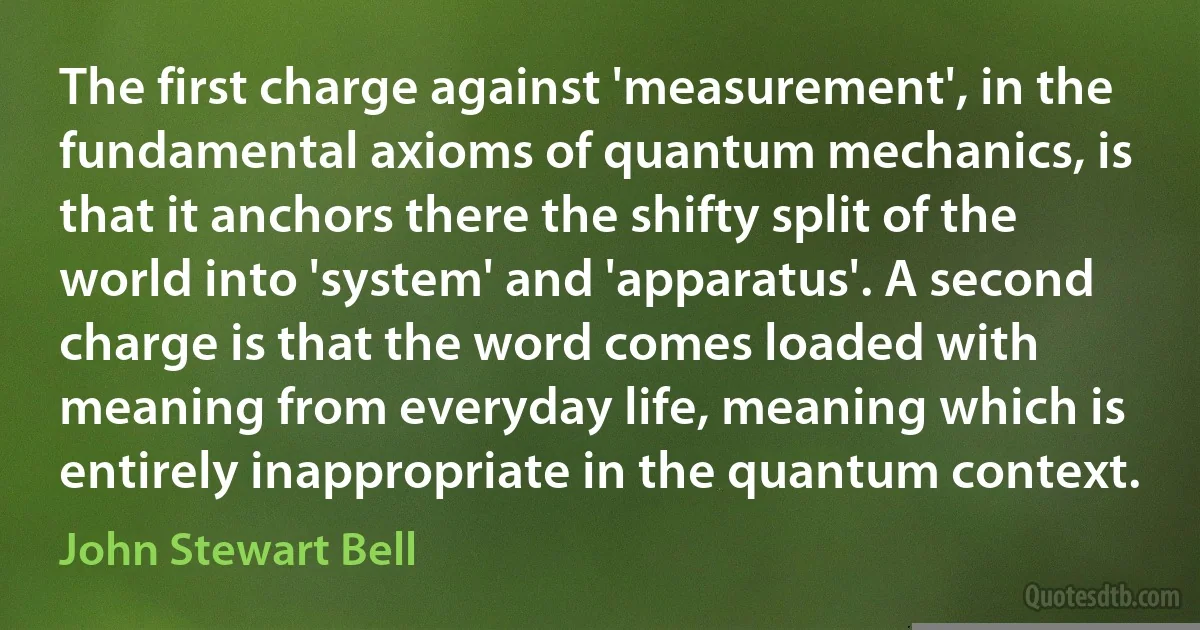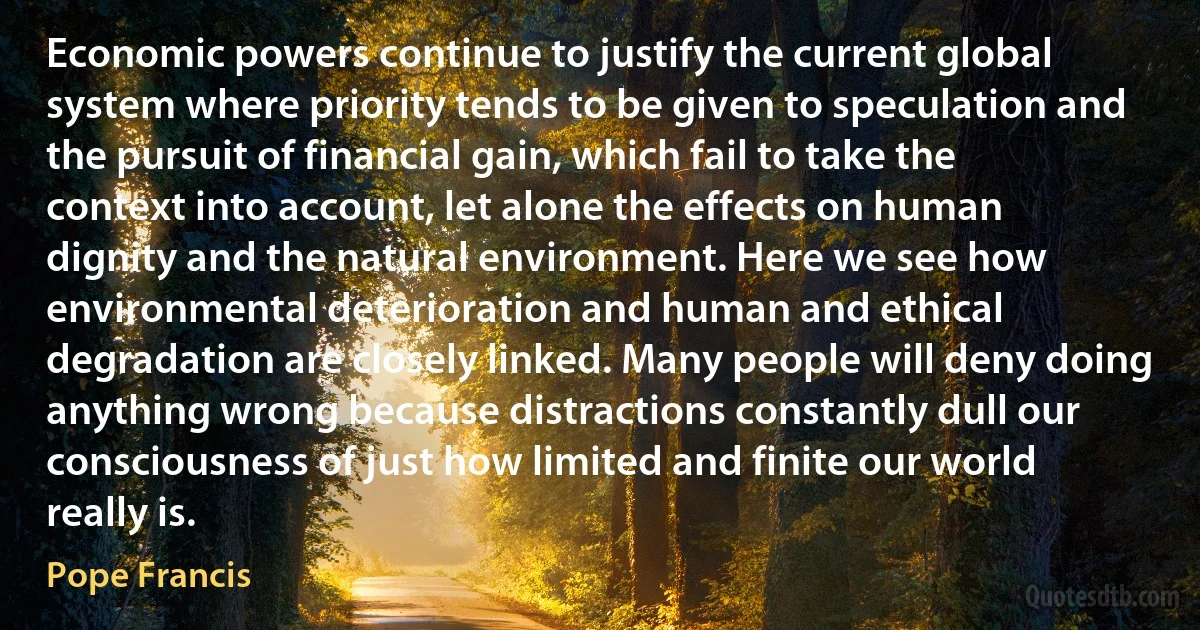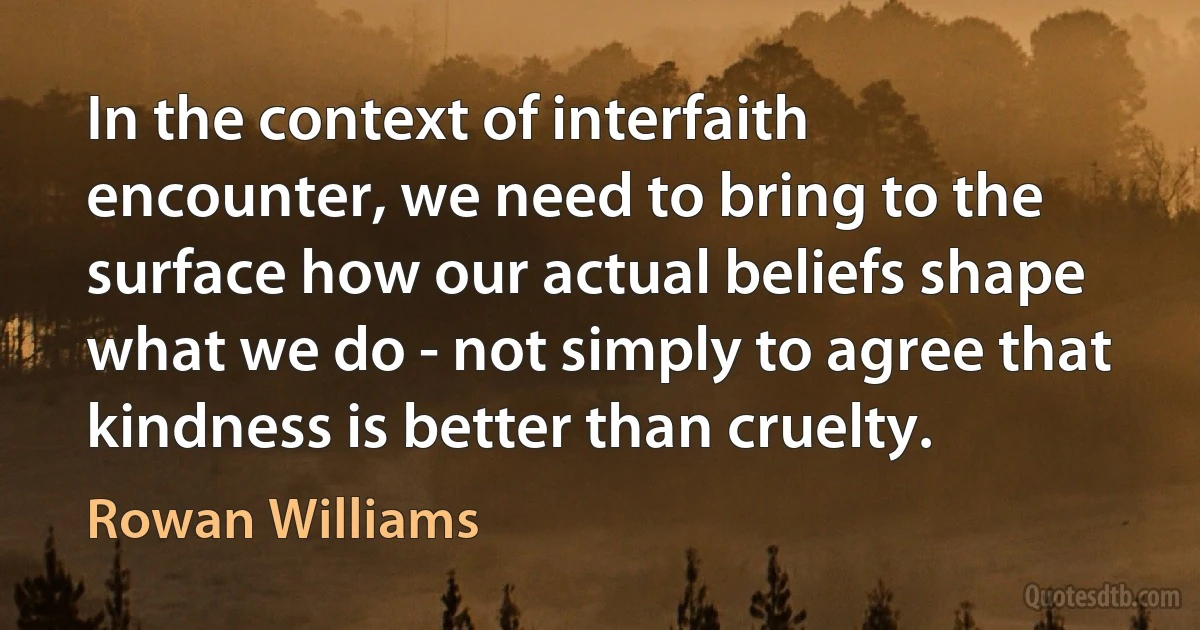Context Quotes - page 9
I believe that the world is totally connected: that is to say, that there are no events anywhere in the universe which are not tied to every other event in the universe. ...It is... an essential part of the methodology of science to divide the world for any experiment into... relevant and... irrelevant. We make a cut. We put the experiment... into a box. ...the moment we do that, we do violence to the connections ...I get a set of answers which I try to decode in this context. ...I am certainly not going to get the world right, because the basic assumption that I have made about the world is a lie. ...it is bound to give me only an approximation to what goes inside the fence. Therefore, when we practice science (and this is true of all our experience) we are always decoding a part of nature which is not complete. We simply cannot get out of our own finiteness.

Jacob Bronowski
Regarding the Galilee, Mr. [Moshe] Sharett already told you that about 100,000 Arabs still now live in the pocket of Galilee. Let us assume that a war breaks out. Then we will be able to cleanse the entire area of Central Galilee, including all its refugees, in one stroke. In this context let me mention some mediators who offered to give us the Galilee without war. What they meant was the populated Galilee. They didn't offer us the empty Galilee, which we could have only by means of a war. Therefore if a war is extended to cover the whole of Palestine, our greatest gain will be the Galilee. It is because without any special military effort which might imperil other fronts, only by using the troops already assigned for the task, we could accomplish our aim of cleansing the Galilee.

David Ben-Gurion
We're really not very good about putting music in a social and political context, particularly classical music. It's all sort of above everything. But in South Africa, everything is politicised. You play a piece of classical music out there and you are making a real cultural statement. Or you play with a marimba band and you are saying something else. I think that's the way things should be. The way people write about music makes it seem completely devoid of social context. And audiences drift away as a result.

Joanna MacGregor
Someone gave me a pig heart in a mason jar. It was in the context of art, I believe. It was chained to a gourd and spattered with the expected colors of paint. And it was indeed, really and truly, a pig's heart. I'm vegan and so it was kind of upsetting and pretty ironic, really, because it was the type of person I would want to guess was infatuated or obsessed.

Davey Havok
Since most subjects studied in school consist largely of theories... language education must include not only the serious study of what truth and falsehood mean in the context of a subject, but also what is meant by a fact, an inference, an assumption, a judgment, a generalization... In this way students will be learning both the language of a subject and the methods of inquiry in that subject, since inquiry consists of nothing else but the generation of questions, the invention of definitions and metaphors, the separation of facts from inferences, the forming of generalizations...

Neil Postman
I know this is going to sound peculiar but denon was the one who help me, im so glad, but you're not really conscious of what you're saying. You see a picture in front of you and it's your job to interpret that picture for the viewers at home and put what they are seeing into context with everybody else in the race. You use whatever words come into your head at the time. It's not something that you can think about.

Murray Walker
The biggest issue in this election is something called flip-flopping, and all candidates are accused of doing it. A strong leader is expected to maintain steadfast resolve in his opinion even if the environment changes or he gets new information. In any other context, that would be considered the first sign of a brain tumor. When presidents do it, it's called leadership, and frankly, we can't get enough of it.

Scott Adams
Since we cannot completely eliminate existential risk - at any moment, we might be tossed into the dustbin of cosmic history by the advancing front of a vacuum phase transition triggered in some remote galaxy a billion years ago - the use of maximin in the present context would entail choosing the action that has the greatest benefit under the assumption of impending extinction. Maximin thus implies that we ought all to start partying as if there were no tomorrow. That implication, while perhaps tempting, is implausible.

Nick Bostrom
In following Seth's dream recall instructions, we found ourselves collecting some excellent examples of precognitive dreams. Some were clear-cut and almost exactly matched the foreseen future event. Others were partially disguised in symbolism. Still others were so interwoven with other dream material that we marked them as indicative of precognition and let it go at that. Sometimes dreams that seemed nonsense contained one clear, important image that shortly -- within a few days -- would appear in a different context entirely. In several cases, two or more future events would be condensed into one dream.

Robert Butts
Young people have to stop flattering themselves that they're Nostradamus and would have foreseen, had they been around then, everything that's unacceptable now. And for further context Mel Brooks wrote one of the most successful musicals of all time around the song 'Springtime for Hitler.'

Bill Maher
This concept of capital-rebuilding is so important that it may be desirable to digress for a moment. In the broadest sense of the word, capital means the sum total of the valuable things possessed by the individuals of a society, excluding "claims," that is, mere titles to property. The word is used to mean both the inventory of these valuable things; the houses, factories, machines, livestock, stocks of raw materials, and goods in all stages of completion; and also to mean the sum of the values of these things. It should generally be clear from the context which of these two meanings is intended.

Kenneth Boulding
The suggestion that words are symbols for things, actions, qualities, relationships, et cetera, is naive, a gross simplification. Words are slippery customers. The full meaning of a word does not appear until it is placed in its context, and the context may serve an extremely subtle function -- as with puns, or double entendre. And even then the "meaning" will depend upon the listener, upon the speaker, upon their entire experience of language, upon their knowledge of one another, and upon the whole situation. Words do not "mean things" in a one-to-one relation like a code. Words, too, are empirical signs, not copies or models of anything; truly, onomatopoeia and gestures frequently seem to possess resemblance, but this resemblance does not bear too close examination. A cockerel may seem to say cook-a-doodle-do to an Englishman, but a German thinks it says kikeriki, and a Japanese kokke-kekko. Each can paint only with the phonetic sound of his own language.

Colin Cherry
The idea that a few people have about the gene being the target of selection is completely impractical; a gene is never visible to natural selection, and in the genotype, it is always in the context with other genes, and the interaction with those other genes make a particular gene either more favorable or less favorable. In fact, Dobzhanksy, for instance, worked quite a bit on so-called lethal chromosomes which are highly successful in one combination, and lethal in another. Therefore people like Dawkins in England who still think the gene is the target of selection are evidently wrong. In the 30s and 40s, it was widely accepted that genes were the target of selection, because that was the only way they could be made accessible to mathematics, but now we know that it is really the whole genotype of the individual, not the gene. Except for that slight revision, the basic Darwinian theory hasn't changed in the last 50 years.

Ernst Mayr



